Cargando...
Recursos educativos
-
Nivel educativo
-
Competencias
-
Tipología
-
Idioma
-
Tipo de medio
-
Tipo de actividad
-
Destinatarios
-
Tipo de audiencia
-
Creador
Lo más buscado
- Mapa conceptual del sistema endocrino
- Siglo XIX
- Aprender a mirar
- Mickey Mouse
- Peso y gravedad
- Actividades educativas para niños en cuarto grado
- Comunidades autónomas
- leyendas para niños
- matemáticas primaria
- Imprimir material primer grado
- Razonamiento
- Actividades didacticas para segundo grado
- juegos matemáticas primaria
- Carga eléctrica
- Comarques de Catalunya
-
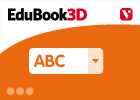
Final self-evaluation 11.08 - The Animal Kingdom (II). Vertebrates
EduBook Organización
- 4682 visitas
Are the following sentences true or false? Reptiles have waterproof skin. Reptiles breathe through gills. A fish's swim bladder gives it information about its surroundings in the water. Birds have…
-
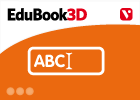
Final self-evaluation 9.02 - The Plant Kingdom
EduBook Organización
- 4263 visitas
Complete the text with the missing words: stem – multicellular – Photosynthesis – mineral – ground – water – autotrophic – sap – roots – vessels Plants are and organisms that rooted to…
-
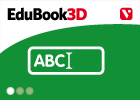
Initial evaluation 02 - Animals
EduBook Organización
- 4169 visitas
Write true (T) or false (F) for each sentence. Invertebrates have bones. ➝ Sea anemones and jellyfish are cnidarians. ➝ Sponges live in the water. ➝ Sea urchins and worms have bilateral symmetry.…
-
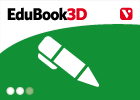
Check. Climate change
EduBook Organización
- 3927 visitas
Review what you have studied and do the activities: Explain in your own words what climate change is and what causes it. Relate what you have studied about the greenhouse effect with the global warming…
-
Changing states of matter
EduBook Organización
- 3557 visitas
5.1. States of matter You have already learnt that there are three states of matter in nature: solid, liquid and gas. Remember that solid particles have low mobility as they are in a fixed position.…
-
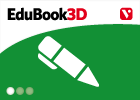
Answer. Vertebrates
EduBook Organización
- 3300 visitas
Remember what you have studied in this section and answer the questions: What do all vertebrates have? What do we mean by an articulated skeleton? Most vertebrates have limbs that allow them to move.…
-
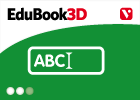
Complete. Parts of a cell
EduBook Organización
- 3103 visitas
Complete the following text about cells with the correct words: cytoplasm shapes nucleus cell membrane cells cytoplasm Cells have many different : round, long, square etc. Although they have different…
-
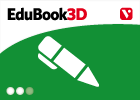
Answer. From zygote to birth
EduBook Organización
- 2964 visitas
Remember what you have studied in this section and answer the questions: How are oviparous animals born? Which animals have simple eggs? Which animals have more complex eggs? Where do the embryos of…
-
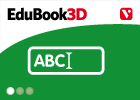
Complete. Mammals
EduBook Organización
- 2878 visitas
Complete the text with the correct words: bat dolphins four young Mammals look after their until they can take care of themselves. Mammals have limbs, although some, like and whales have turned them…
-
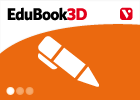
Think about it. Heat and temperature
EduBook Organización
- 2874 visitas
Remember what you have studied in this section and answer the questions: What two physical phenomena are used to calibrate a thermometer and why? Why do we also use the name centigrade for the Celsius…
Te estamos redirigiendo a la ficha del libro...













